- Home
- Warwick Deeping
Shabby Summer Page 2
Shabby Summer Read online
Page 2
“Perhaps you can help me, Bob.”
“I hope so, m’lady.”
“I want to see ‘Mrs. J. Dykhuis.’ Have you got her?”
Bob scratched his head.
“ ‘Mrs. J. Dikkis.’ We’ve got her.”
“That’s the lady, I think.”
“She’s over here.”
Bob led her along the grass path, and with a proud finger pointed out the brilliant little bush with its salmon orange flowers.
“That’s she. Lovely thing, m’lady.”
“She is. Is she in a pot?”
“Yes.”
“How many of her have you?”
“As a matter o’ fact, m’lady, only three.”
“How sad! I can’t be so greedy as to ask for one.”
“Most people don’t think o’ that, m’lady.”
“No, I dare say not. Don’t let me keep you, Bob. I’ll just wander about and sit for a while.”
“Very good, m’lady. Mr. Ghent may be back any time.”
“Yes. I wish we could get some rain, Bob.”
“So do I, m’lady. The ground’s so cloddy you can’t use a hoe proper. I’ll leave the key in the lock.”
“Thank you, Bob.”
She was wearing black, and as she wandered up and down the grass way looking at the flowering shrubs, her black dress seemed to make the live colours more vivid. They were of every shade of rose and red and carmine and purple and mauve and orange and flame. Some of them were almost indescribable, and coming again to look at Mrs. J. Dykhuis, she smiled upon this burning bush and thanked some secret God that she had ceased from fussing over words. Life was not a catalogue, though catalogues might be necessary. If she abominated any particular pose, it was the he or she who paraded round a garden, exhibiting a pretentious knowledge and sesquipedalian Latin names. How the plants must chuckle and whisper “Prig!” Though, did such egotism matter, any more than these clashing contrasts in colour mattered? She had had her own Blue Border phase, and outgrown it and its too sophisticated languor.
She sat down on the oak seat under the clematis. She rather wanted to wait for the tree man’s return. He pleased her, like the life he lived and the live things he grew. So unusual in this age of crashing speed and noise. He was a happy person, though he did not make much money, and would have been even happier had the pound sterling ceased to be. She liked his young and rather silent dignity, his aloofness that smiled suddenly, his eyes, his teeth, his sun-browned cleanness, his strength. Her own son had been killed in the Great War, and the memory made her more tender to lads like Ghent.
* * *
Peter, seeing that particular dog-cart outside the gate, dismounted, and leaning his bicycle against one of the gate-pillars, went in, in search of the lady. For the moment she was invisible to him, but he was visible to her, and she observed him as one watches some creature that is not conscious of being watched. He did not hurry. He paused more than once to look at one of his bushes, while she saw him as youth, somehow retaining its sense of mystery and a belief in the essential loveliness of things. Such youth was dear to her, and growing more dear now that she was becoming old.
She saw him as a young man caring for trees and country things, instead of setting out to save souls in some shabby semi-slum, though she could picture him in either part. He had serenity, poise. Belief of some sort and in something was inherent in his striding self. If he wore the halo of youth as she wished it to be worn, unselfconsciously and with a happy rightness, she blessed him for it. Might that halo remain about his dark young head.
She rose and he saw her. He smiled. If she found the youth in him good to look upon, he found in her something that to him was indescribable. To say that she was a great lady was not adequate; great ladies can be devastatingly stupid. When near her he was conscious of being in another world, the world in which child and man can meet.
Had she been here long? Had he known that she was to have been expected, he would have been here to receive her. He had no hat to salute her with, but the bend of his head and his smile and his pleasure in seeing her were sufficient. She hated people who fawned on her, and all those who behaved like over-polite tradesmen.
“I wanted to see ‘Mrs. J. Dykhuis.’ At my age one is allowed to satisfy every whim.”
“Have you seen her?”
“Yes, Bob introduced me. But I could look again.”
He walked beside her down the green path, and if he was the young courtier to his queen, his courtliness was like his smile, natural and inevitable where she was concerned. He bent over the bush, and half kneeling, slipped a hand under one flowery truss with the almost tender reverence of the man who loved beauty for itself.
“Wonderful thing—colour. Would you like a specimen?”
“No.”
The upward lift of his head and his sudden smile challenged her.
“Did Bob tell you we had only three?”
“He did.”
“He shouldn’t have done.”
“I asked him. I am not a greedy old woman.”
He straightened and stood looking at the burning bush.
“I have one which is just coming into flower. Yes, it’s in a pot. I’m afraid I can’t send it. My car had an argument with Miss Crabtree’s machine. It’s a garage job.”
She was watching him with eyes that had lost some of their gentleness. Always—the Crabtrees, the type that tainted life with the breath of crude commerce! There were moments when the Crabtree philosophy enraged her, though she knew that it was foolish, at her age, to relapse into such anger.
“Dear child! Did she drive into you?”
“Yes. Complete disregard for anyone who might be round the corner. But that’s the Crabtree way.”
He laughed. He did not appear to be bitter about it, and his young poise with its head-in-air serenity made her smile at him with secret approval.
“That sort of thing doesn’t vex you?”
“Why should it? Why should one let it? After all——”
“Life’s too precious to be wasted on certain people?”
“Yes. Besides, it’s a Crabtree hobby, getting other people rattled.”
She wanted to lay a hand on his shoulder and say, “My dear, keep that spirit. And may you find somebody in life to help you keep it. Some woman, if she is wise, is going to be very lucky.”
II
Mrs. Maintenance saw him pass the kitchen window with a gun over his shoulder and Bunter at his heels.
Mrs. Maintenance’s window, though she set her cap at nobody these days and wore her hat with a complete and complacent motherliness, looked out upon Marplot’s nursery yard and old brick outbuildings. The stable, with its blue door, had become the office and laboratory, and its hayloft a place of storage. Its low-pitched roof, sagging with age, was capped with a little white louvre that carried a brass windvane. The yard was partly paved, and its grey stones lapped like water against the rust pink of the old brickwork whose mortar had become silvery, soft and friable. There was another building standing at right angles to the stable, a vast timber shed used for packing, which carried a mass of ivy and seemed both to support and be supported by it. The trees of Badger’s Wood climbed into the further sky like a green cloud closing the horizon.
Mrs. Maintenance emptied the tea-leaves out of the pot, and remarked to herself and the kitchen clock that it was a pity that you could not empty out your troubles in that simple way. The clock ticked back loudly at her, and somewhere a wood-pigeon cooed consolingly. Mrs. Maintenance watched Bunter’s little black stern disappearing from view behind his master’s brown legs, and blessed them both. What a pity grocer’s bills came in, and that bread had to be paid for, and that clothes could not be washed without soap! Yes, Mr. Peter had put everything into Marplot, and he had struggled through a tough seven years, buying in new stock and raising it, and getting the ground as it should be, but now the nursery was like a well-stocked shop, and times should be easier.
&nb
sp; Peter carried a gun, not because he was moved to slaughter anything, but because there was one creature—the rabbit—which had to be dealt with ruthlessly when your land was a nursery for young trees. Let a doe trespass under the wire and bring forth her young in some secret “Stab,” and you were in for a pocketful of trouble. Also, one youngster might wriggle through the wire and grow and prosper on succulent young shoots. Peter had had wire dug in all round the nursery, save where the river made the boundary safe.
Here, at the head of the Green Way, grew two splendid trees, a weeping beech whose foliage seemed to fall like green water from a fountain, and a Camperdown elm trained like a vast leafy umbrella. These trees were the relics of a previous tenant, and though they occupied much ground, they were too singular and lovely to be touched. Next came the seed and propagating beds where the young trees stood for three years before being planted out, and these most precious beds were surrounded by an additional belt of wire. Scotch Bunter had disappeared into the shadowy interior of the weeping beech, for this mysterious tree had a fascination for the dog. Ghent paused and waited, for he knew Bunter’s way and humoured it. The dog reappeared, to trot at his heels as he passed down the green alleyway between the young plantations. Each strip of ground had a white peg and a number, and scribbled on the peg in indelible pencil was the date when that particular piece had been planted. Paths broke off at right angles, and here and there a plot was lying fallow, to take the trees that had to be moved every two years. The evening sunlight slanted across the young plantations, and each little spire seemed to glow like the spire of a strange city. There were young flowering-trees in bloom, thorns, laburnum, magnolias, rhododendrons, lilacs, Judas trees, early viburnums, and many others. Hoes had been at work, and Ghent paused now and again to see how the weeds had wilted. His face had a young serenity, for the ordered beauty of his little world was sweet and good to him. It smelt and glowed and spread itself in greens and golds and reds and pinks and purples, against the varied greenness of the fields and woods. Each tree was a perfect specimen of its kind, clean and sleek and symmetrical, for Ghent was a young fanatic and could not suffer a misshapen tree. Blackbirds were singing in the green smother that was Badger’s Lane. The water falling at the weir maintained a distant underchant.
Peter Ghent looked about him and found this green world good. For seven years he had laboured to make these acres what they were, and if the March weather that was past had been exceptional, he could dare to believe that the year would be a happy one. He was short of cash, yes, damned short of it, and the nights were being cold and none too kind, but he was not a grower of fruit, thank God! He had trees and shrubs to sell, thousands of them. Last year’s orders had not been so bad and this year he hoped to double them. If he had more capital—but life on the land was full of ifs—he could afford to advertise more lavishly; he could run a light lorry of his own instead of hiring one from Loddon; also, a motor-cultivator would help him. But these things would come. His capital was in his precious trees, and as they grew they would increase in value provided they were not too big to move. Yes, it was a good world and a good life, though it had its worries; and was any job worth while unless it twisted your guts on occasions and kept you wakeful at night?
The Green Way ended in a little field of about five acres where Ghent kept ground in reserve for tree-moving, and where he grew a supply of the commoner stuff for shelter-belts or hedge planting. Here were rows and rows of thuyas and yews and Cupressus Lawsoniana and Macrocarpa, of all ages and sizes, also a few small plantations of thorn, privet, beech, hornbeam and holly. Ghent might be a specialist, but in the cause of commerce utility had to be served. Turning right towards the Badger’s Lane hedge, he went to examine a field gate that opened into the lane. It was one of the weak spots in his defences, for though it was kept locked, and had an apron of wire netting attached to its lower bars, it was a favourite loitering place for local lovers, and often he would find the wire bulged in by a mischievous or thoughtless boot. He examined the wire and found it good, and passing on along the hedge, he cocked his gun and spoke warningly to the dog. He was approaching The Barbican, a playful name that had for him a particular significance. First came a great hedge of thorn and rhododendron ponticum. There was a tunnel cut in this hedge, and beyond it grew a row of young Lombardy poplars planted as a wind-break. The boundary was closed by a stout fence of chestnut posts, netting and barbed wire, with a grass space between it and the poplars. Ghent, with his gun at the ready, and the dog obediently at his heels, slipped through the green tunnel and peered right and left. Time after time he had caught a rabbit feeding on the strip of grass, and had discovered when he had bowled it over, a malicious hole in the protecting wire.
But there was no brown marauder here to-night, and he had taken a step towards the poplars when he saw something and stood still.
Beyond his boundary stretched a wilderness of rough grass, brambles, young birch trees, and bracken. Later in the year it would be a mass of thistles and of ragwort, and a perpetual menace to a man who kept his own ground clean. Mr. Roger Crabtree, deciding that Temple Towers should possess a park capable of confronting the Vandeleur dignity across the water, had grubbed up hedges and filled in ditches and thrown half a dozen fields together, and planted young trees, but since his affection for nature did not endure unless it produced profits, the Crabtree park had become a wilderness. Rabbits swarmed in it, and most of the young trees were dead, having had their bark nibbled by these furry pests when feed was short in winter. This derelict land had begun the feud between Ghent and Mr. Crabtree. Temple Towers had refused to deal with its forbidden weeds, and Ghent had reported old Crabtree to the proper authority. Temple Towers, having refused to move in the matter, had been taken to court and fined, but the weeds still multiplied.
Ghent had seen a figure moving up from the river and following the line of the fence, old Crabtree himself on one of his prowls. Almost daily the old man would patrol his boundaries to see if his property had been interfered with. His was a singular figure, suggesting Neanderthal Man, the big bun-shaped head pushed forward, the shoulders rounded, the posterior thrust out, the knees bent. The jowl was that of a bulldog, perpetually straining forward, as though to seize something in its teeth. There was a suggestion of slaver and of heavy breathing. Mr. Crabtree wore no hat. He carried an ash stick, planting its point grimly on the ground with every step he took.
Ghent moved forward until he was close to the wire fence, and stood there with his gun on his shoulder. The dog growled, and being reproved, lay down close to his master’s feet.
The old man came up the gentle slope from the river, keeping to the rough grass and avoiding patches of bramble and of young fern. Once or twice he diverged to strike at Ghent’s fence with his stick, and the blow went singing along the wire. Peter stood so still beside the poplars that old Crabtree might have passed him by unseen, but suddenly Bunter let out another growl, and the squat figure swung round. With stick planted on the ground and gun on shoulder, age and youth confronted each other in the silence of that lonely place.
Crabtree had badger’s brows. His little dark eyes glistened like pebbles.
“Ha, you, Ghent! I want a word with you.”
Ghent stood quite still, staring straight at Mr. Crabtree. He did not speak, or smile, or show any emotion. The stick prodded the ground.
“Insulted my daughter. No manners. Anything to say?”
Ghent had nothing to say. He knew his man, and that to this truculent old devil who loved a storming row, nothing was so baffling as silence. He stood straight and still, staring across into the other’s eyes.
Crabtree’s stick struck the ground.
“Ha, nothing to say for yourself! Let me tell you, my lad, that my daughter isn’t to be insulted by a fellow like you.”
Not a flicker, not a word, not a movement, though Bunter was quivering at his master’s feet. Old Crabtree glared. His mouth hung open for a moment, vacuous and arrogant. Then th
e lips snapped to. He made a gesture with his stick.
“Nothing to say? If I were a younger man I’d come across and give you a lesson.”
And suddenly, Ghent smiled. Otherwise his stillness was utter. He did not speak, but his smiling eyes looked straight into old Crabtree’s. They continued to stare at him until the old man seemed to feel the pressure of their young, unflinching scorn, and turned suddenly away.
“Ashamed of yourself, I see. Nothing to say? Well, you remember, young Ghent, to be polite to your betters.”
It was as though this last piece of blasphemy was too much for Bunter. The dog made a rush for the wire and began barking at the retreating figure. Ghent spoke to him quietly. “Heel, Bunter, we must learn how to behave.” Old Crabtree heard the words, swung round, glared and let out a growl.
“Don’t think you can be facetious with me, my lad.” Then he went on, puffing a little, for he was a heavy man and prone to shortness of breath. His big flat head seemed to sit down between his shoulders. His little thick legs straddled slightly as he picked his way over the rough ground. And Ghent, still immovable, watched him go, and knew that he had got the better of his neighbour.
Some irreverent person had, in Melissa Vandeleur’s hearing, described the Temple Towers drive as Monkey Puzzle Parade, and the eyes of Temple Manor had flashed at the sally, for in an attempt to be singular the original owner of Temple Towers had planted araucarias on either side of the private road. They had grown into considerable trees, and stood black and forbidding like great funeral plumes, but untouchable by those who valued their skins. There was no such avenue like it in the whole county, and Roger Crabtree was proud of his Chile pines. It did not occur to him that these grim, stiff, noli-me-tangere trees symbolized him to his neighbours.
Stodging along in the rough grass beside the hedge of Badger’s Lane he arrived at the red brick lodge at the lower end of the avenue. He was feeling the heat, both within and without. He faced about, and leaning on his stick, pulled out a green silk handkerchief and wiped his forehead.

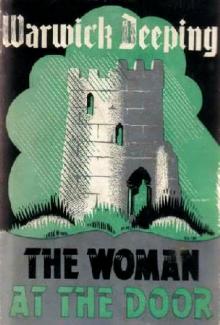 The Woman at The Door
The Woman at The Door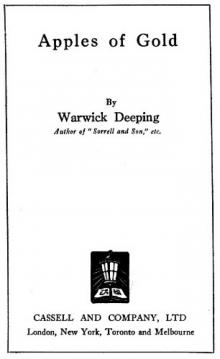 Apples of Gold
Apples of Gold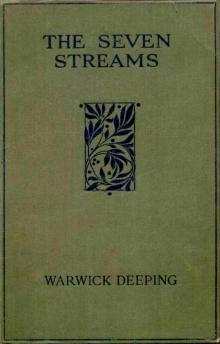 The Seven Streams
The Seven Streams Old Wine and New
Old Wine and New No Hero-This
No Hero-This Two in a Train
Two in a Train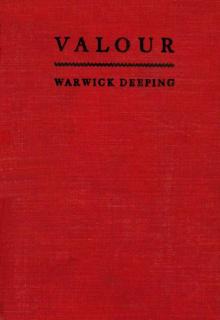 Valour
Valour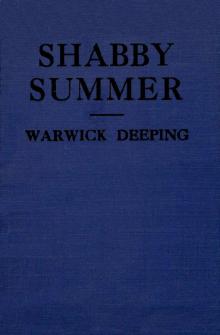 Shabby Summer
Shabby Summer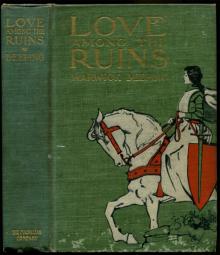 Love Among the Ruins
Love Among the Ruins The Short Stories of Warwick Deeping
The Short Stories of Warwick Deeping